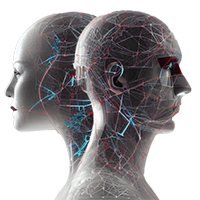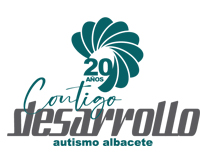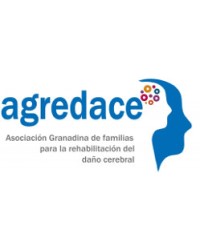
Human Digital Twins for fostering Prosocial Behaviour (HDT-PROSOCIAL)
Proyecto PID2022-140907OB-I00 financiado por MICIU/AEI/10.13039/501100011033/ y por FEDER, UE.
Approach
HDT-PROSOCIAL Hypothesis
Our starting hypothesis is that Human Digital Twins are capable of improving people’s life experience by including social interaction capabilities, as well as reasoning and prediction. Based on this hypothesis, the general objective of the project is to offer a holistic approach, independent of the domain, that allows the development of HDT, which will be applied to the health field.

Towards Human Digital Twins
Although two decades have passed since the term Digital Twin (DT) was coined as the conjunction of three elements: “a real space, a virtual space and a link for the bidirectional flow of data between both spaces for the convergence of physical objects and virtual”, it has been in recent years that this approach has become one of the topics of greatest interest, not only for the scientific community, but especially for the business and industrial sector. One of the domains in which the use of Digital Twin is breaking out is health. Specifically, the use of Human Digital Twins (HDT) is proposed as the technology that will allow complete management of all aspects related to people’s health.
What we will achive
Scientific Goals
Identify characteristics and requirements of HDTs for their specification, monitoring, analysis and simulation of their behavior
Define a development process for modeling context-aware HDTs
Develop a proposal to guide the design of the HDT architecture so that it supports those desirable characteristics
Develop the necessary mechanisms to allow HDTs to reason about their behavior considering social aspects
Develop those components that favor the integration of Extended Reality solutions that facilitate the interaction of humans with their HDTs and other DTs in the environment.
What we will achive
Domain Specific Goals
Enhance the socialization of children and adolescents with neurodevelopmental disorders
Enhance prosocial behaviors in children and adolescents with social behavior disorders
Research Team

Víctor López-Jaquero
Project Co-Leader
Universidad de Castilla-La Mancha

Francisco Montero
Project Co-Leader - Full Professor
Universidad de Castilla-La Mancha

Pascual González López
Researcher - Full Professor
University of Castilla-La Mancha

Javier Jaén
Researcher - Full Profesor
University Politechnic of Valencia

Elena Navarro
Researcher - Full Profesor
University of Castilla-La Mancha

Dulce Romero Ayuso
Researcher - Full Profesor
University of Granada
International Researchers

Uwe Zdun
Full Professor
Universitat Wien
In Collaboration With

Association of Parents of People with autism spectrum disorder

Association of Parents and Friends of Children with Special Needs and Attention to Diversity

Centro Base de Atención a Personas con Discapacidad

Unidad Educativa Dr. Manuel Agustín Cabrera Lozano
Outcomes
Results
Journal Papers
2025
E. Pretel, E. Navarro, V. C. Pujol and S. Dustdar, «Digital Twins and Artificial Collective Intelligence: Synergies for the Future,» in IEEE Internet Computing, vol. 29, no. 1, pp. 75-85, Jan.-Feb. 2025 (IF: 4.4, Q1). https://doi.org/10.1109/MIC.2024.3521607
González-García, J.J., Pretel, E., López-Jaquero, V., Montero, F., González, P. Smart-Pomodoro: Wearable Technology for Improving Time-Management, Engagement and Focus in Children with ADHD. International Journal of Human–Computer Interaction HIHC. (2025) (IF: 4.9 , Q1). https://doi.org/10.1080/10447318.2025.2542886
Herrera, J.L. Moya A., Berrocal, J., Murillo, J.M., Navarro E., A Developer-Focused Genetic Algorithm for IoT Application Placement in the Computing Continuum. IEEE Transactions on Services Computing. (2025) (IF: 5.5, Q1). https://doi.org/10.1109/tsc.2025.3556641
Pretel, E., Navarro, E., Pujol, V. C., & Dustdar, S. (2025). Digital Twins and Artificial Collective Intelligence: Synergies for the Future. IEEE Internet Computing, 29(1), 75-85. (IF: 3.7, Q1) https://doi.org/10.1109/mic.2024.3521607
Abellán, J., Pretel, E., Navarro, E., López-Jaquero, V., & González, P. Human Digital Twins – Principles and Challenges. Journal of Ambient Intelligence and Smart Environments (2025) (IF: 1.8, Q3) https://doi.org/10.1177/18761364251388806
Zhinin-Vera, L., Pretel, E., López-Jaquero, V., & Navarro, E., González, P. Mindful Human Digital Twins: Integrating Theory of Mind with multi-agent reinforcement learning. Applied Soft Computing. (2025). (IF: 7.2, Q1). https://doi.org/10.1016/j.asoc.2025.112939
Pretel, E., Zhinin-Vera, L., Navarro, E., López-Jaquero, V., & González, P. MAS4DT: A novel proposal for developing Digital Twins following a Multi-Agent System approach. Journal of Systems and Software, 112344. (2025). (IF: 4.1, Q1). https://doi.org/10.1016/j.jss.2025.112344
2024
Macías, A., Muñoz, D., Navarro, E., González, P. : Data fabric and digital twins: An integrated approach for data fusion design and evaluation of pervasive systems. Information Fusion 103: 102139 (2024). (IF: 15.5, Q1). https://doi.org/10.1016/j.inffus.2023.102139
Pretel, E., Moya, A., Navarro, A., López-Jaquero, V., González, P., Analysing the synergies between Multi-agent Systems and Digital Twins: A systematic literature review, Information and Software Technology, Volume 174, 2024, 107503,ISSN 0950-5849, (IF: 4.3, Q1) https://doi.org/10.1016/j.infsof.2024.107503.
Conference Papers
2025
González-García, J.J., Pretel, E., López-Jaquero, V., Montero, F., González, P. (2025). Smart-Pomodoro: A Tool to Gamify Children’s Study Sessions. In: Ardito, C., et al. Human-Computer Interaction – INTERACT 2025. INTERACT 2025. Lecture Notes in Computer Science, vol 16108. Springer, Cham. (iCORE B) https://doi.org/10.1007/978-3-032-04999-5_15
Zhinin-Vera, L., González-García, J.J, López-Jaquero, V., Navarro, E., González, P. 2025. Multi-Agent Systems for Bullying Intervention. In Proceedings of the 24th International Conference on Autonomous Agents and Multiagent Systems (AAMAS ’25). International Foundation for Autonomous Agents and Multiagent Systems, Richland, SC, 2835–2837.
2023
Zhinin-Vera, L., López-Jaquero, V., Navarro, E., González, P. (2023). A Computational Model for Agents in a Social Context: An Approach Based on Theory of Mind. In: Bravo, J., Urzáiz, G. (eds) Proceedings of the 15th International Conference on Ubiquitous Computing & Ambient Intelligence (UCAmI 2023). UCAmI 2023. Lecture Notes in Networks and Systems, vol 835. Springer, Cham. https://doi.org/10.1007/978-3-031-48306-6_1
Moya, A., Zhinin-Vera, L., Navarro, E., Jaen, J., Machado, J. (2023). Clustering ABI Patients for a Customized Rehabilitation Process. In: Bravo, J., Urzáiz, G. (eds) Proceedings of the 15th International Conference on Ubiquitous Computing & Ambient Intelligence (UCAmI 2023). UCAmI 2023. Lecture Notes in Networks and Systems, vol 842. Springer, Cham. https://doi.org/10.1007/978-3-031-48642-5_21
Zhinin-Vera, L., Moya, A., Navarro, E., Jaen, J., Machado, J. (2023). A Reinforcement Learning Algorithm for Improving the Generation of Telerehabilitation Activities of ABI Patients. In: Bravo, J., Urzáiz, G. (eds) Proceedings of the 15th International Conference on Ubiquitous Computing & Ambient Intelligence (UCAmI 2023). UCAmI 2023. Lecture Notes in Networks and Systems, vol 835. Springer, Cham. https://doi.org/10.1007/978-3-031-48306-6_2
Jiménez-Ruescas, J., Sánchez, R., Maya, Y., Fernández-Caballero, A., García, A.S., González, P. (2023). A Framework for Managing the Experimental Evaluation of Ambient Assisted Living Systems. In: Bravo, J., Urzáiz, G. (eds) Proceedings of the 15th International Conference on Ubiquitous Computing & Ambient Intelligence (UCAmI 2023). UCAmI 2023. Lecture Notes in Networks and Systems, vol 835. Springer, Cham. https://doi.org/10.1007/978-3-031-48306-6_13
Montero, F., López-Jaquero, V. (2023). Una propuesta de evaluación de la interacción considerando valores y actitudes. Interacción 2023 – XXIII Congreso Internacional de Interacción Persona-Ordenador, Septemeber, 4-6 2023, Lleida, Spain, 103-111.
Books and Books Chapters
Prototypes

Proyecto PID2022-140907OB-I00 financiado por MICIU/AEI /10.13039/501100011033/ y por FEDER, UE.
01/09/2023 – 31/08/2026
